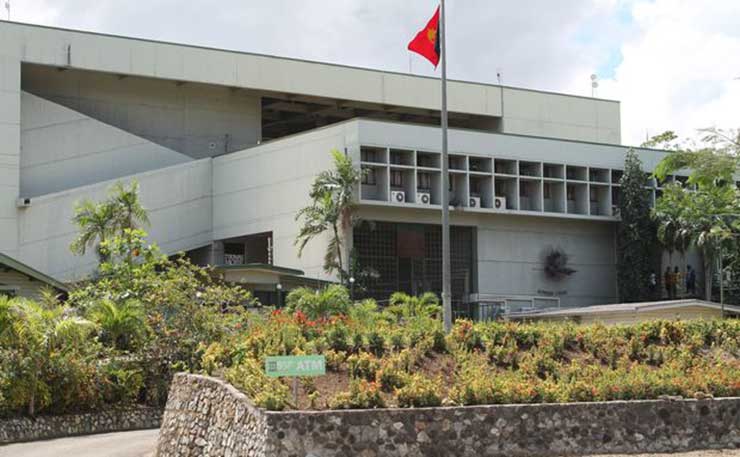Tuesday’s Papua New Guinea Supreme Court decision has two vital lessons for Australia: the power of a Bill of Rights and the importance of a courageous Court. Thomas Kiat explains.
The judgment blew a hole in Australia’s offshore detention network by declaring the arrangement unlawful under PNG’s Constitution. In doing so it raised the bar for the Australian Constitution and judiciary by doing what our High Court has been unable or unwilling to do for more than 20 years: liberating arbitrarily detained asylum seekers.
A Firm Constitution
The PNG Constitution says that no person can be deprived of their liberty unless one of several exceptions applies. Relevant to immigration detention, this includes detention for the purpose of preventing unlawful entry into PNG, for lawfully removing a person from PNG, and for undertaking the processes behind either. That is, detention is to keep you out or get you out, and for associated bureaucratic functions.
Many Australians would assume our Constitution contains a similar provision guaranteeing personal liberty. It doesn’t. In fact, it says very little about basic human rights at all.
There are a few reasons for this. Our Constitution was framed before the post-war human rights era. And unlike the Americans, our basic law is more concerned with the delicacies of inter-state relations than throwing off the shackles of tyrannical government.
Finally, our Constitution is incredibly hard to change.
Tuesday’s Supreme Court ruling showed that PNG’s Constitution can be easy to change, but that when it comes to human rights, it’s a one-way street.
In a tactical move borrowed from our own government’s Nauru detention centre litigation playbook, the PNG government amended the Constitution (no referendum required) to carve out a special freedom-free-zone for our asylum seekers on Manus Island.
But the Supreme Court struck it down. It fell short of the constitutional requirement that laws restricting rights or freedoms must be “reasonably justifiable in a democratic society having a proper respect for the rights and dignity of mankind”.
Quite a mouthful, and a sentiment completely antithetical to our prisons on Manus.

Constitutional Rights and Legal Fiction
According to Border Force, 1,373 people are detained on Manus and Nauru, with almost 1,500 onshore. Of those onshore detainees, around 700 have been locked up more than 12 months. But given our Constitution isn’t up to scratch, can we really blame the High Court for not ordering their release?
Interestingly, for over 20 years the High Court has had access to a legal precedent somewhat similar to the PNG Constitution’s limitation on detention. Despite our Constitution’s paucity when it comes to basic rights, sometimes the vibe of the thing can make a huge difference.
In 1992 the High Court decided a case involving a number of asylum seekers who had been detained for over two years after arriving by boat (yes, you’ve heard this one before).
In doing so, the Court found that the Constitutional separation of judicial powers limited the ability of the government to detain non-citizens (just for being non-citizens) to what is reasonably necessary to enable processing for entry into or removal from Australia.
Or in English, the vibe of the Constitution stops the government locking up immigrants and asylum seekers unless they are in the process of letting them in or kicking them out.
Yet this constitutional principle has been serially underutilised. In an unholy trinity of decisions in the early 2000s, the High Court held that mandatory immigration detention could be constitutional for an indefinite length, despite the harshness of its conditions, and even for children. While the High Court has recently required the government to actually process those being detained, it has not yet taken the practical next step — ordering the release of those detained much longer than immigration processing should reasonably take.
Another disappointing application of the constitutional principle against arbitrary detention came earlier this year in the Nauru offshore detention case.
Key to the majority High Court decision upholding the arrangement was the argument that our government wasn’t really detaining the asylum seekers. This argument held legal water despite the fact that we moved them there, we pay multinationals that run the prison, and our officials have the right to ‘step in’ if anything goes wrong.
Which brings us back to the courage of the PNG Supreme Court, whose decision eschewed legal fiction in telling truth to power.
It recognised that the asylum seekers ‘did not enter PNG and do not remain in PNG on their own accord’. The Justices named the political reality: “It was the joint efforts of the Australian and PNG governments that has seen the asylum seekers brought into PNG and kept at the [Manus Island Processing Centre] against their will.”
They combined legal and moral reasoning, referring to the example of Martin Luther King and international covenants.
We have much to learn from the basic law and highest court of our nearest neighbour.
Donate To New Matilda
New Matilda is a small, independent media outlet. We survive through reader contributions, and never losing a lawsuit. If you got something from this article, giving something back helps us to continue speaking truth to power. Every little bit counts.





